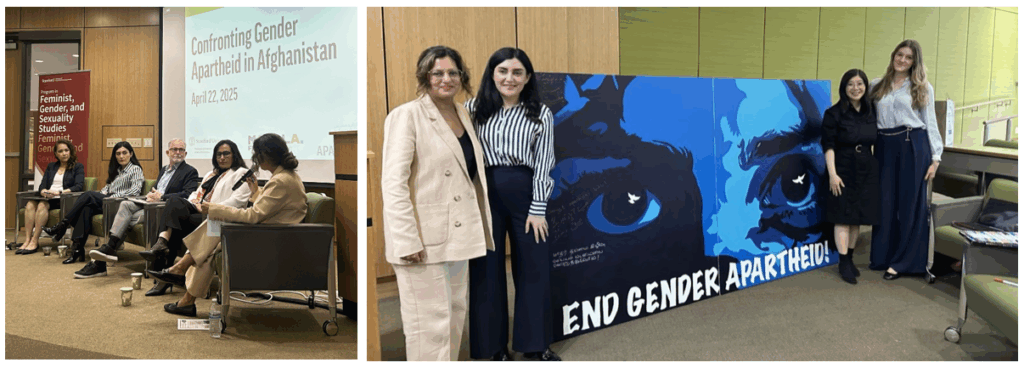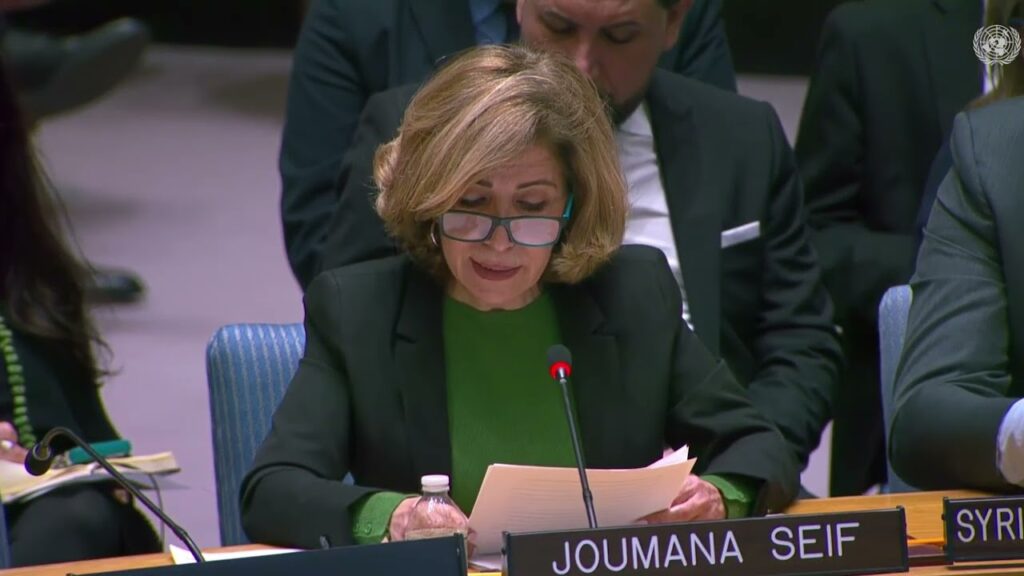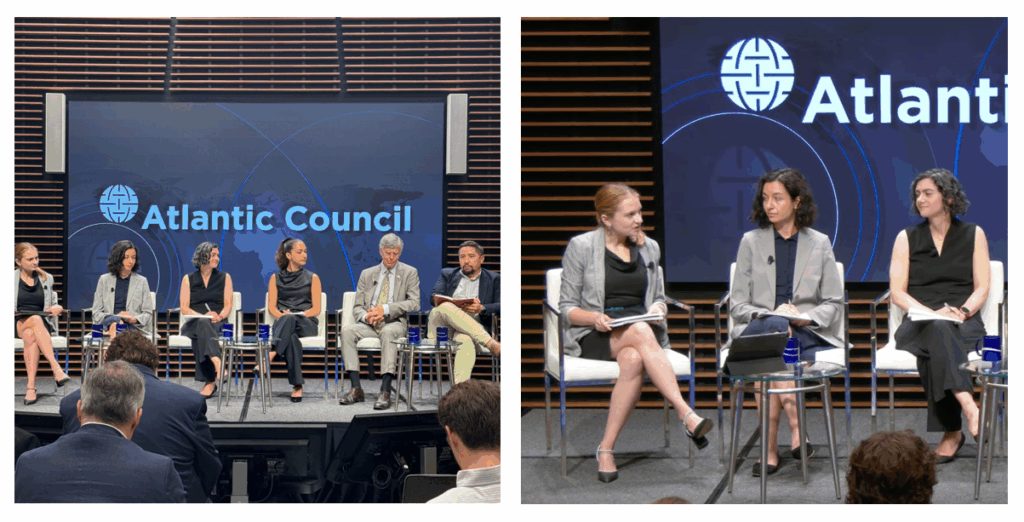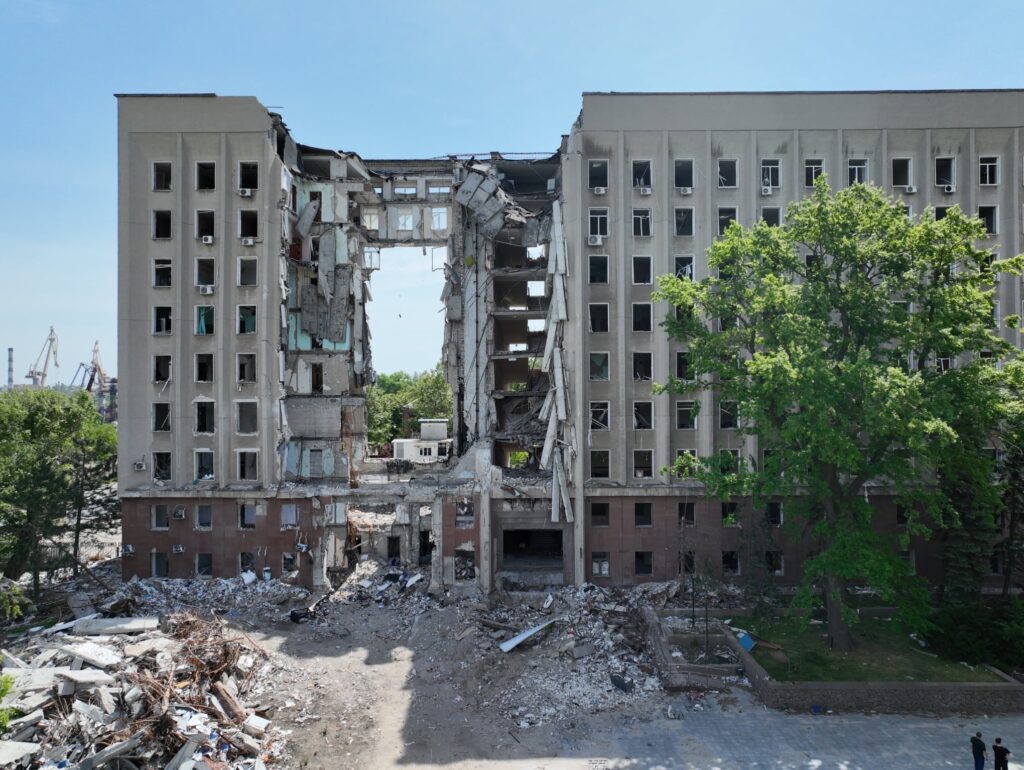The Strategic Litigation Project (SLP) works at the intersection of law and policy to inject fresh thinking into how governments and practitioners can apply legal tools to advance human rights and accountability around the world. With projects covering Afghanistan, Iran, Syria, China, and Ukraine, the SLP works in partnership with affected communities and regional experts to examine and strengthen justice pathways for human rights violations, atrocity crimes, financial abuses, and acts of terrorism, among other offenses.
In recent months, the SLP team has welcomed new team members, including new Distinguished Fellow Beth Van Schaack and new Nonresident Senior Fellow Priya Pillai. The SLP has expanded its work advocating for an end to atrocity crimes in China against Uyghur and Turkic people, and has continued to document human rights abuses in the Islamic Republic of Iran. Additionally, the team has continued its work pursuing justice for victims in Syria following the fall of the Assad regime in December 2024, including working with Syrian experts and civil society organizations to advocate for the establishment of a Syria Victims Fund. And with the United Nations (UN) draft treaty on crimes against humanity formally moving forward to negotiations in the coming years, the SLP has continued to advocate together with Afghan and Iranian women’s rights defenders for the inclusion in the treaty of the crime of gender apartheid. Looking ahead, the SLP will continue to work with multilateral bodies, policymakers, and civil society organizations to advance its flagship projects.
Below find more information about the SLP’s work this year to date. As we plan ahead, we ask you to consider supporting the SLP’s work at the link below. On behalf of the SLP team, I thank you for your continued support of our work and mission.
Kind regards,
Gender Apartheid
This year, the SLP has continued working with Afghan and Iranian women’s rights defenders in a legal and political campaign pursuing the codification of the crime of gender apartheid under international law. Since the UN Sixth Committee decided in November to move forward to negotiations on a treaty focusing on the prevention and punishment of crimes against humanity, the SLP’s advocacy with states’ permanent missions to the UN in New York—led by SLP Senior Legal & Policy Advisor Alyssa Yamamoto—has sought the inclusion of the crime of gender apartheid. To further highlight the push for codification to member states, SLP Director Gissou Nia spoke in March at a panel event on the sidelines of the sixty-ninth session of the UN Commission on the Status of Women, “Addressing Gender Apartheid: Towards an Integrated System of Protection.”
In April, the SLP convened a “Symposium on Confronting Gender Apartheid in Afghanistan” at Stanford University, co-hosted with the Malala Fund and the Stanford Program in Feminist, Gender, and Sexuality Studies. The two-day conference aimed to unpack the policy and legal impacts of gender apartheid codification, including its implications for humanitarian, security, economic, and political engagement. The symposium featured panels with leading Afghan academics, policy experts, and activists, and the symposium’s keynote address was given by new SLP Distinguished Fellow Beth Van Schaack.

Shadow report submission to the UN Committee on the Elimination of Discrimination Against Women
In June, the SLP, together with Foley Hoag LLP and the Civic Engagement Project, co-submitted a shadow report to the Committee on the Elimination of Discrimination against Women on the Taliban’s continued perpetration of gender apartheid in Afghanistan. The submission analyzed the scope of the legal decrees issued by the Taliban, which have effectively deprived women of all status in the country, and sets out general recommendations in response to the Taliban’s systematic and pervasive erosion of the rights of women and girls in Afghanistan.
Read more about recent developments for the campaign to recognize and codify the crime of gender apartheid, written by our experts
Metra Mehran in Amnesty International: “Afghanistan: A Call to Global Conscience on International Women’s Day”
Metra Mehran in the New York Times: “What’s Best for Afghanistan? Not the Taliban.”
Azadah Raz Mohammad and Akila Radhakrishnan in OpinioJuris: “The Growing Imperative to Recognize and Codify Gender Apartheid: Demonstrating the Need and Responding to Critics (Part I)”
Azadah Raz Mohammad and Akila Radhakrishnan in OpinioJuris: “The Growing Imperative to Recognize and Codify Gender Apartheid: Demonstrating the Need and Responding to Critics (Part II)”
Law, technology, and human rights
This year, SLP Senior Law & Tech Advisor Lisandra Novo has continued advancing research on the intersection of law and technology, focused on spyware accountability and multilateral cybersecurity negotiations. In May, she attended the 2025 NATO International Conference on Cyber Conflict in Tallinn, Estonia, and presented her article on the Russian-led initiative at the UN to set up a global convention on the prevention, investigation, and prosecution of cybercrime. Her ongoing research identifies possible mitigation strategies for states to address the human rights and cybersecurity risks associated with the treaty. She also attended, as an invited member of civil society, a side event in March organized by the UN Office on Drugs and Crime and the government of Vietnam on the future signing ceremony of the UN Cybercrime Convention. As part of the SLP’s work on this convention, she has actively participated in the Stakeholder Working Group on Cybercrime, a multistakeholder group monitoring the development and implementation of the convention, convened by the Alliance of NGOs on Crime Prevention & Criminal Justice. She has also represented SLP at various spyware accountability civil society convenings, including several focused on developments related to the UK- and France-led Pall Mall Process.
In August, the SLP, along with the Atlantic Council’s Cyber Statecraft Initiative, hosted a joint event exploring existing avenues for pursuing accountability for past and ongoing spyware abuses. The event was hosted in anticipation of a new report from the SLP, “Spyware blasts: Strict liability for abnormally dangerous activities.” This report, authored by Novo, explores how theories of civil liability can be tested in spyware cases to bring civil cases in the United States and United Kingdom.
Iran Digital Archive Coalition
The SLP continued its work with partners in the Iran Digital Archive Coalition to create the Iranian Archive—a repository of digital evidence documenting human rights abuses and international crimes committed during the Islamic Republic of Iran’s crackdown on the Woman, Life, Freedom movement. In January, the Investigations Lab at UC Berkeley’s Human Rights Center, a coalition partner, released two reports (the latest in an ongoing series) demonstrating the importance of digital evidence in future human rights accountability. In March, Novo traveled to Brussels with Azadi Archive and Mnemonic, other coalition partners, to jointly present on the Iran Digital Archive Coalition in an immersive show at the CEPS Ideas Lab 2025, where they engaged with members of the European Parliament about the coalition’s work documenting serious crimes in Iran and the need for accountability.
Learn more about the Iran Digital Archive Coalition
SLP Deputy Director Nushin Sarkarati and other members of the coalition contributed pieces to a Just Security blog series discussing the coalition’s work documenting and analyzing serious crimes committed during the Woman, Life, Freedom movement and the work of the UN Independent International Fact-Finding Mission on the Islamic Republic of Iran. Read the experts’ contributions below.
Jessica Peake, Nushin Sarkarati, and Kelly Liu in Just Security: “Safeguarding Evidence: The Coalition that Preserved Content from Iran’s ‘Women, Life, Freedom’ Protests”
Sara Hossain, Viviana Krsticevic, and Shaheen Sardar Ali in Just Security: “A Roadmap for Justice in Iran: An Update from the UN’s Fact-Finding Mission”
Andrea Richardson and Alexa Koenig in Just Security: “Open-Source Information Provides Powerful Evidence of Gender Crimes in Iran and Beyond”
Syria Victims Fund
Following the fall of the Assad regime, the SLP has continued its efforts to advocate for a Syria Victims Fund—an intergovernmental mechanism designed to ensure that proceeds from legal actions related to Syria’s conflict are redirected to benefit victims and survivors of international law violations. In May, the SLP team and Syrian partners finalized a policy brief offering recommendations for the Syria Victims Fund’s design, governance, functionality, and operations, drafted by consensus by a working group of nineteen diverse Syrian civil society leaders, victim representatives, and experts. The SLP and partners are now sharing the policy brief with civil society partners for further awareness-raising, and with state representatives to garner support for establishing the Syria Victims Fund.
Additionally, in March, former SLP Nonresident Senior Fellow Joumana Seif gave remarks at the United Nations Security Council, where she urged the international community to support post-conflict Syria. In her speech, she called for investments in development and reconstruction, services for victims of gender-based violence, and support for a transparent, holistic transitional justice mechanism—one focused on what victims and survivors need to rebuild their lives.
The SLP will continue to work with Syrian partners to advocate for the Syria Victims Fund to provide interim reparative measures to victims in the near-term, in conjunction with and complementary to a holistic national transitional justice program that ensures the full, meaningful, and equal participation of diverse Syrian civil society.

Ukraine Accountability
SLP Staff Lawyer Celeste Kmiotek and Nonresident Senior Fellow Haydee Dijkstal have continued their work examining the Islamic Republic of Iran’s complicity in war crimes and crimes against humanity for its provision of drones to Russia for use in aerial attacks in Ukraine, in partnership with the International Partnership for Human Rights (IPHR). In January, they submitted their findings and analysis to an international accountability mechanism and met with states and other stakeholders in February to discuss next steps. Kmiotek discussed this work in February, on a panel co-hosted by IPHR and Harvard Law School’s International Human Rights Clinic (IHRC) called “Missile Terror in Ukraine: Paths to Prevention and Accountability for Russian War Crimes and Crimes Against Humanity.”

In June, the SLP and the Atlantic Council’s Eurasia Center, together with IPHR and IHRC, hosted a hybrid panel event on new findings and policy implications surrounding Russian aerial attacks against Ukraine over the last three years. Authors of IPHR and IHRC’s newly published report on the Russian aerial campaign presented their legal analysis, finding that these aerial attacks amount to several crimes against humanity, including those of murder, extermination, persecution, and other inhumane acts. Ambassador William B. Taylor, a distinguished fellow with the Eurasia Center, and Michael Cecire, a security and defense researcher from the RAND Corporation, spoke about what these findings mean for policy discussions.
Advocacy for the Uyghur community
The SLP continued its work, led by SLP Senior Legal & Policy Advisor and China Lead Rayhan Asat, regarding human rights abuses against the Uyghur population in China. In January, the SLP submitted an updated assessment to twenty-five UN mandate-holders detailing China’s human rights violations in the Xinjiang Uyghur Autonomous Region (XUAR) of China, including documentation and testimonies of deaths and economic extortion in the XUAR. As part of her ongoing advocacy, Asat traveled to meet with high-level representatives of the governments of Mexico, Colombia, Argentina, Canada, and Chile to discuss the material within the UN assessment and urge them to take action within multilateral bodies regarding the widespread violations of human rights in the XUAR.
In April, Asat spoke at a panel event in New York hosted by the International Peace Institute and the United States Holocaust Memorial Museum’s Simon-Skjodt Center for the Prevention of Genocide, titled “The Ongoing Mass Atrocity Crimes Against the Uyghurs and How the UN Can Respond.” The event focused on the role of the UN to respond to and prevent mass atrocities in the Xinjiang region and featured a screening of the Emmy-award winning film Reeducated. At the event, Asat spoke on the importance of multilateral action in protecting Uyghur rights in China: “I urge UN member states to explore a Third Committee complaint against China . . . International law can only flourish when we utilize it; otherwise, we are robbing the international system of its development. We must use the system for the Uyghur cause as we have done for other atrocity crimes.”
Stay Updated
Follow us on social media and support our work
Subscribe to our newsletter for quarterly updates on the SLP’s work on prevention and accountability efforts for atrocity crimes, human rights violations, and terrorism and corruption offenses around the world.
Image: 08 October 2019, Baden-Wuerttemberg, Ulm: A statue of Justitia holds a weighing bowl in front of the district court. Photo: Stefan Puchner/dpa



